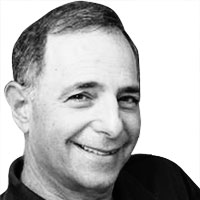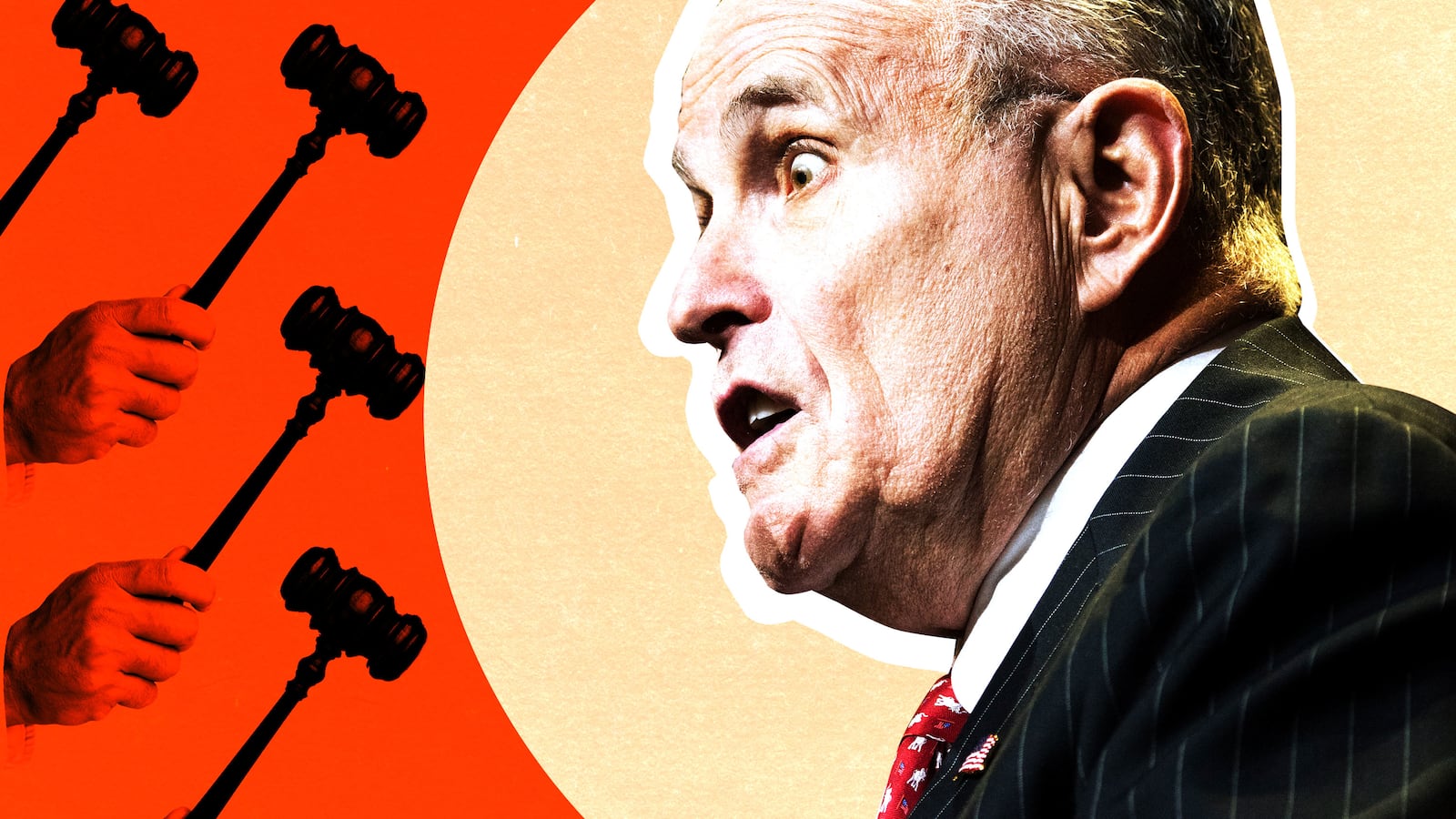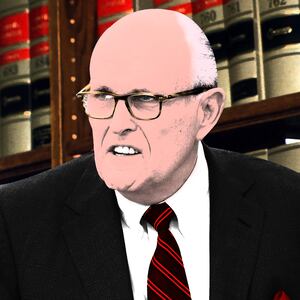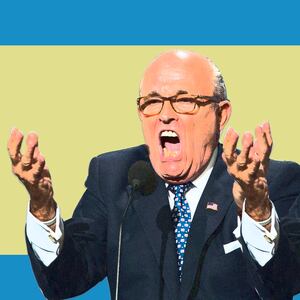After months assailing Robert Mueller as a supposedly biased and unethical prosecutor before the release of his report, Rudy Giuliani shrugged at the news that House Democrats had subpoenaed the special counsel to testify later this month: “Who cares?”
The answer is that a lot of people care what Mueller has to say about President Donald Trump, including many of the former federal prosecutors whose investigations during the 1980s catapulted Giuliani to fame as the hard-hitting U.S. attorney for the Southern District of New York. In interviews with The Daily Beast, Giuliani’s former Justice Department colleagues spoke of Mueller in glowing terms, and most said that his report had set out a triable obstruction of justice case against Trump. Many expressed deep disappointment in Giuliani’s attacks on Mueller and the FBI, albeit with a grudging recognition that his approach has been effective.
To Giuliani, at least, whatever Mueller tells Congress about his client comes too late. “When I started everyone trusted Mueller and we[r]e contemplating impeachment,” he told me in a text-message interview this week. “When we finished more people distrusted Mueller’s unethical group of angry Dems.”
When Rudolph W. Giuliani resigned in January, 1989 after an acclaimed five-and-a-half-year run as U.S. attorney in Manhattan, reporters from the courthouse press room presented the soon-to-be mayoral candidate with a sketch of him ascending into heaven on a puff of clouds.
There was more than a touch of press-room sarcasm in that gift, but at the same time, the late artist Joe Papin’s drawing captured not only the hype but also the hope that surrounded this rising star in 1980s New York. No one—least of all the assistant U.S. attorneys who felt fortunate to have worked for Giuliani—could have imagined his incarnation 30 years later as the prosecutor-trashing defense lawyer for another rising star from that era, a certain celebrity real-estate developer.
I covered the Manhattan federal court beat back then, and it caught my attention that 30 or more lawyers who’d worked with him were among the more than 1,000 former federal prosecutors who signed a statement declaring that “Mueller’s report would, in the case of any other person not covered by the Office of Legal Counsel policy against indicting a sitting President, result in multiple felony charges for obstruction of justice.”
The surprise to me was not that so many experienced lawyers thought that the Mueller report set out a crime, contrary to Attorney General William Barr’s spin. Rather, it was the statement’s reference to Giuliani and alleged witness tampering:
“Some of this tampering and intimidation, including the dangling of pardons, was done in plain sight via tweets and public statements; other such behavior was done via private messages through private attorneys, such as Trump counsel Rudy Giuliani’s message to Cohen’s lawyer that Cohen should ‘[s]leep well tonight[], you have friends in high places.’”
That’s a particularly strong accusation within the buttoned-down world of former federal prosecutors, who tend to parse their words carefully.
“I have heard not one person defend him,” said Mary Shannon Little, a former assistant U.S. attorney who was involved in investigations that led to Giuliani’s two biggest political corruption cases, which grew from scandals in the New York City Parking Violations Bureau and Wedtech Corp., a politically connected defense contractor. “Rudy’s behavior has sparked a particular kind of outrage. He might as well be Roy Cohn.”
Giuliani told me he wasn’t surprised by the ex-prosecutors’ statement but is disappointed:
“My former Assistants, except for a few, are quintessential Eastern elite and subscribe to that way of seeing politics,” he responded. “I am not surprised at their viewpoint, just disappointed as to why they want to insert themselves in a negative way regarding me. I have fond memories of them and don’t expect gratuitous and ill-informed second guessing from them.”
I didn’t know the politics of the assistant U.S. attorneys I covered during the 1980s. They were very smart young lawyers who went to work prosecuting cases for the Reagan administration—not exactly a left-wing breeding ground. More to the point, they worked for the “Sovereign District of New York,” a nickname that respects the office’s prestige and independence from political interference.
As would be expected in a high-stakes investigation, many Southern District prosecutors from that era have played a role in the Trump-Russia saga, which Giuliani called a “Super Bowl” case. Lawyers at various times for Andrew McCabe, former Trump lawyer Michael Cohen, James Comey and Rick Gates were all former federal prosecutors in Manhattan. At the heart of the struggle is the brinkmanship between Giuliani and former FBI director Comey, whom Giuliani hired as an assistant U.S. attorney in 1987. “It was my dream job,” Comey wrote in his book A Higher Loyalty. “I would work for a man who was already becoming legendary: Rudy Giuliani.”
Elliott Jacobson had a similar feeling when Giuliani hired him in 1985, launching a Justice Department career of more than three decades. But Jacobson, who signed the ex-prosecutors’ statement, is disillusioned. He was particularly disturbed by Giuliani’s comment that FBI agents who executed a search warrant for former Trump lawyer Cohen’s office were like “stormtroopers.” Contrary to what Trump and Giuliani claimed, he said, searches of lawyers’ offices were done “all the time,” with proper safeguards and oversight.
“Rudy would have been the first to go after a guy like Michael Cohen and use a search warrant to do that,” Jacobson said. “The Rudy I knew was a fearless corruption prosecutor. I don’t think he would’ve had any question in going after this guy. He is in my view a different person.”
Another former prosecutor under Giuliani, who asked not to be identified, said that a column Jacobson wrote last year for the New York Law Journal articulated how many Southern District alumni feel. “What happened to Rudy Giuliani? Where is the sharp-as-a-tack, reform-minded, valiant corruption fighter who was one of my mentors and role models?” Jacobson asked.
“I think we’re all floored by Rudy,” said Peter Sobol, who signed the former prosecutors’ statement.
Benito Romano, who served as the No. 3 official in Giuliani’s office and then became U.S. attorney on an interim basis after Giuliani moved on, was among those I recalled as being close to him. He did not sign the online statement, but said that “for me, the evidence seems to be clear” on the obstruction case against Trump. “This is not a close call.” On Giuliani’s role for the defense he said only, “No comment.”
Aaron Marcu, who also served as the No. 3 official in the U.S. attorney’s office, said it’s important for hearings to be held on Mueller’s findings because, “as much as he should be respected and thanked, I think he let us down at the end.” He declined to pass judgment on Giuliani’s legal strategy:
“I know Rudy to be a very focused and strategic lawyer, and I assume that his public defense of the president was the result of a carefully considered strategy,” he said. “Rudy appears to have chosen a very public defense of his client to avoid impeachment by the House and conviction in the Senate.”
Other former Southern District prosecutors I spoke with shared the view that Giuliani’s strategy of attacking esteemed investigators as the true criminal conspirators may have been odious, but not crazy in the way that some pundits have insisted.
“One, it seems to have been effective. He helped to persuade a lot of people that Trump has done nothing wrong,” said retired federal Judge John S. Martin, Jr., who preceded Giuliani as U.S. attorney (Giuliani, who had been the No. 3 official in the Justice Department before that, was Martin’s boss at the time). “I have otherwise been not impressed. Given his background, his attack on the FBI was shameful.”
When I asked Martin to imagine what Giuliani might have done in Mueller’s role, he said, “Rudy would be out in front of the television cameras every day telling about the terrible crimes that were committed.”
Charles LaBella, a Giuliani assistant who later became U.S. attorney in San Diego, called attacks on Mueller “unconscionable” but didn’t seem as surprised by Giuliani’s tactics as the Southern District colleagues who had asked him “what happened” to their former boss. “As a prosecutor he was really good. He was hard-working and he was very aggressive, and now he’s an aggressive defense lawyer,” LaBella said. “His personality doesn’t change.”
I tried various avenues to reach Andrew McCarthy, the only one of Giuliani’s former assistants I know of who has assailed the Mueller probe publicly. Republican members of the House Intelligence Committee brought him in to testify in a June 12 hearing to support their own brief against the Mueller investigation. He didn’t respond to my inquiries.
Bruce Green, a professor at Fordham Law School recognized for expertise in legal ethics, declined to comment on Giuliani’s handling of the case. As a Southern District prosecutor, he was chief of appeals, making him an important legal adviser to the U.S. attorney.
In an email, Green suggested that Mueller’s report was more an invitation to impeachment, not indictment. Having worked on independent counsel Lawrence Walsh’s investigation into the Iran-Contra scandal during the Reagan administration, Green said he agreed with Walsh’s view that it took an extra-high standard of proof to indict a sitting president, given how disruptive it would be. And in any case, the normal practice in the Justice Department is not to seek an indictment unless prosecutors believe there really is evidence to prove it beyond a reasonable doubt, he said.
“Reasonable people differ on this,” LaBella said. “As a stand-alone count, I think it’s a very difficult count to bring itself.”
But many of the former prosecutors I spoke with said that in his prosecutorial days, Giuliani would have found a way to press a case against Trump, or at least to make a conclusive finding. “If the case were a Southern District case, we would have found some way to proceed and not leave it where Bob [Mueller] did,” said Walter Mack, who had prosecuted a vicious Gambino crime family mob.
If Giuliani were a prosecutor now, “He would have been all over it and he would have fought hard to indict the president,” Shannon Little said.”His attitude clearly was that there was no person above the law… He would’ve indicted every one of the [Trump] kids if he could not indict Trump. He would’ve indicted every other person in Trump’s orbit until Trump said ‘uncle.’”
Giuliani rejected the idea that he would have found a way to indict Trump. “Only if I was intellectually dishonest,” he told me. Responding to those who questioned his strategy of attacking the investigators: “They can’t evaluate the tactics because they don’t know the facts and they can’t argue with the result. If that got that result, ever, they would ask for a bonus.”
He told me of his quiet response to a high-profile allegation raised during the summer of 1984 against John Zaccaro, the husband of Democratic vice-presidential nominee Geraldine Ferraro. ”I was asked to open an investigation of him in August 1984 just after she was nominated and said it was too close to election and not an emergency and could wait,” he wrote. (Zaccaro pleaded guilty to a misdemeanor fraud charge in state court in January, 1985.)
Shannon Little recalled Giuliani’s role in a politically sensitive Wedtech case, focus of an influence-peddling scheme involving members of Congress, a Maryland state senator, New York City elected officials and the White House. Twenty public officials were convicted, including President Ronald Reagan’s adviser Lyn Nofziger (later overturned on appeal). U.S. Attorney General Edwin Meese III—Giuliani’s boss—was investigated but cleared by an independent counsel.
During one of the Wedtech trials—Rep. Mario Biaggi, a Bronx Democrat, was among the defendants—the defense kept hammering at Meese’s involvement with Wedtech. As Shannon Little recalled, a fellow prosecutor in the case, Edward Little (her future husband, it turned out) went to Giuliani to say he needed to tell the jury in his closing argument that yes, Meese was a sleaze, as defense lawyers contended, but that this was no defense for the men on trial. Giuliani gave the go-ahead, and it led to what I remember as an electric moment in the courtroom.
What I didn’t know at the time was that, according to Shannon Little, Giuliani also refused Meese’s order to fire Edward Little. She called Giuliani’s conduct in the case “impeccable.” Now, both former prosecutors are signatories to the damning online statement.







